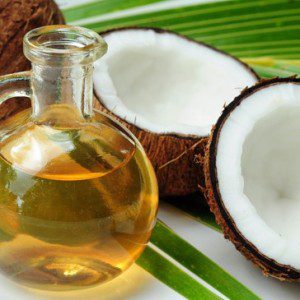By Lissa Butler
Guest Writer for Wake Up World
Like extra virgin olive oil, coconut oil is a great oil to keep in your home. Not only is it a healthy oil to cook and bake with (perhaps even the healthiest), it is a worthwhile addition to a beauty regimen for men and women alike.
How Coconut Oil Is Made
Coconut oil is extracted from the kernel or the meat of the coconut, which is harvested from the coconut palm tree, Cocos nucifera. One way of extracting coconut oil for mass production is by pressing it out of copra, or dried kernel, via a method known as RBD, which stands for “refined, bleached and deodorized.” This method involves chemical solvents that result in a higher oil yield. It is quicker and cheaper to manufacture coconut oil this way, and the final product can be sold at a cheaper price. However, this method often leads to hydrogenation or partial hydrogenation of the oil and the presence of trans-fatty acids, as well as the removal of beneficial fatty acids.
[pro_ad_display_adzone id=”110028″]
Another way of extracting coconut oil from the copra is with the old extraction method of physical or mechanical refining. This method does not involve solvents or lead to hydrogenation and trans-fatty acids. The oil is still refined, but without the use of solvents and several stages of processing to render the end result. Furthermore, this older method of extraction leaves the coconut oil with its medium-chain fatty acids (MCFAs) intact. Both refining methods remove the coconut scent and flavor from the final product. Coconut oil extracted via the older method is often labeled “expeller pressed coconut oil.” The RBD coconut oil is labeled as simply “coconut oil.”
The Virgin Coconut Oil Difference
The third way of extracting coconut oil is from the fresh flesh. This coconut oil is known as “virgin coconut oil.” Don’t be confused, like I was, if you find extra virgin coconut oil at the market. Extra virgin coconut oil and virgin coconut oil are one-and-the-same. There currently are no industry standards that differentiate one from the other. The term “extra virgin” is borrowed from the olive oil industry.
The process for extracting virgin coconut oil requires very little heat and no solvents. This coconut oil is made from the first pressing of fresh coconut flesh, leaving the medium-chain fatty acids, nutrients, mild coconut flavor and smell intact. If you like the taste and smell of coconut oil, virgin (or extra virgin) coconut oil is worth selecting because it contains more nutrients and has more health benefits than refined coconut oil.
The Many Health Benefits of Coconut Oil
The health benefits of coconut oil run the gamut. One of the reasons you should cook or bake with coconut oil is that it has a high saturated fat content. You can use it to cook at high temperatures and even leave it at room temperature for months without it going rancid. It is an extremely stable oil. The medium-chain fatty acids present in coconut oil are a wonderful source of energy for the body. MCFAs help raise metabolism, which can help you maintain a healthy weight or even lead to weight loss when combined with exercise and a healthy diet.
What makes coconut oil so unique is that it contains at least 40% lauric acid, the major medium-chain fatty acid also found in human mother’s milk. Lauric acid is converted to monolaurin in the body and provides the body with antimicrobial, antibacterial and anti-protazoal benefits. That is one of the reasons why breast milk is the best source of food for infants and coconut oil is a great food for everyone else. It protects against viral, bacterial and protazoal infections.
Coconut oil has also been shown to help support thyroid health and potentially reduce the symptoms of hypothyroidism, such as fatigue, weight gain and water retention. This is because coconut oil does not oxidize in the body. Rather, it acts as an energy source, raises basal body temperature and does not require additional enzymes to help break it down since your body recognizes the fatty acids it contains. This allows the thyroid hormones T4 to convert to T3 more effectively.
As for digestion, people with IBS, Crohn’s disease or sensitive digestion find that they do well on coconut oil. This is because the MCFAs help the intestines absorb much needed nutrients. This improved nutrient absorption facilitates healing of the digestive system and the person.
And it doesn’t stop there. Coconut oil has been shown to be effective in cases of candida, high cholesterol, diabetes, Alzheimer’s and chronic fatigue. Topically, coconut oil has been used for centuries to help nourish and health the skin and hair. Whether you have dry skin or hair, or a yeast or fungal infection, research and anecdotal evidence has shown that coconut oil can help with such problems. Coconut oil easily penetrates the skin and hair, getting down to the dermis and hair shaft, leading to healing of the skin and hair.
If using coconut oil is of interest to you, go to your natural food market and look for virgin or extra virgin coconut oil. If you prefer ordering online, Tropical Traditions is a good resource. They also sell skin care products that contain virgin coconut oil. I make a nourishing skin cream that contains virgin coconut oil which is available on my website. Using coconut oil directly on the skin works wonderfully too. The only caveat is that you will likely have to reapply throughout the day, because of how quickly it is absorbed into the skin.
Article Sources
http://www.coconut-connections.com
http://www.tropicaltraditions.com/what_is_virgin_coconut_oil
Previous Article by Lissa
About the Author

Lissa Butler is an herbalist, women’s health expert, staff writer for LiveInTheNow.com and creator of Natural Melange. Her passion for plant-based medicine and holistic nutrition led her to obtain a Masters of Science in Herbal Medicine from the Tai Sophia School of the Healing Arts, which helped her to gain a more well-rounded understanding of herbs in both the scientific and traditional contexts.
This article was republished with permission from Live in the Now, one of the fastest growing natural health newsletters. Visit LiveInTheNow.com to browse their complete library of articles, or join the nearly 60,000 readers subscribed to their Newsletter.
[pro_ad_display_adzone id=”110027″]







